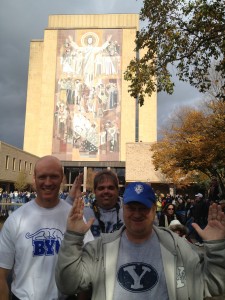BYU football’s independence is a topic that won’t go away.
The reason for this? The landscape of college football is perhaps the most technical, confusing and complicated of all sports league systems in the world.

Every year, debate dealing with conference realignments, strength of schedule, BCS bowls and so forth fill the headlines. But BYU, going independent in 2011, played in the Western Athletic Conference and Mountain West Conference, searching for a place it could win against quality opponents and, in turn, gain the respect of the college-football world.
And BYU is in the most unique and complicated situation of them all.
Amidst a seemingly full-scale facelift in conference positioning and arrangements in 2010, BYU was prompted to make the leap into football independence.
With the Mountain West expanding, the WAC diminishing and Utah leaving for the Pac-12 (taking some of the rivalry with it) the world BYU knew and grew up with was no more.
So BYU moved on, gained independence and started marching forward.
Now, in their fourth year flying solo, the Cougars have reason to be both content and to contemplate the programs future.
What it has meant
Going independent was met with skepticism and enthusiasm from BYU fans and sports analysts alike. Fans knew BYU needed to make a change; it was just a matter of when that change would come.
BYU Athletic Director Tom Holmoe made the decision to go independent as a means to increase BYU’s presence as a national brand, a route that would allow the school to call up big conferences and schedule big-time teams.
Holmoe accomplished that after striking a deal with ESPN to showcase BYU’s games on its national network, giving BYU a tremendous boost in TV viewership.
“We’ve nailed it,” Holmoe said during BYU Football Media Day. “We’re on TV a lot.”
Not only does the team benefit from increased exposure, but the fans do as well.
“They are much more accessible,” said Barrett Richards, a BYU alumnus and loyal Cougar fan.
Being a BYU football fan all his life, Richards loved watching every game he could. After moving to Long Island, New York, it became nearly impossible for him to see any of them. But with BYU becoming independent and securing the TV spot with ESPN, he and thousands of Cougar fans around the country were able to watch their favorite team play again.
“We thought it was great when they announced the TV deal,” Richards continued. “We’ll finally be able to watch the games.”
This coverage ensures that not only does the fan base get to see more of BYU, but now potential BYU players do as well.
“Recruits can now meet them and see them,” said ESPN college football analyst Trevor Matich. “All you need to do is add two or three playmakers at a higher level than you normally get each class, and the next thing you know that adds up to a much bigger capability.”
Indeed, being independent has improved viewership from both the fan base and the recruiting base.
What it will mean
BYU players and coaches have accepted and embraced independence and done all they can to take advantage of it.
But that doesn’t mean they want to stay there forever.
“I like independence,” said Head Coach Bronco Mendenhall. “It’s a good place to launch from.”
“To launch from” certainly doesn’t sound like Mendenhall sees independence as a long-term option.
After recently being snubbed by the ACC and SEC as not being a worthy enough opponent for non-conference scheduling, BYU is realizing that independence isn’t bad … but it’s not the best. The team must compete and win year in and year out with power-conference teams if it is to earn respect as a major football program.
BYU can gain all the viewership and coverage in the world, but that won’t lock it into a top-tier bowl game.
A power conference championship will.
The most viable choice for BYU would be the Big 12.
“We would love to be in the Big 12,” Mendenhall told the Austin American-Statesman newspaper. “I would love to be a member of that conference. I think that would make a lot of sense.”
The Big 12 seems indifferent to considering BYU as a potential member for the time being.
But even with BYU’s future unknown, one thing is clear: BYU must find another option.
Independence has given BYU a national audience today, but the team is aware it will need national credence for tomorrow.




